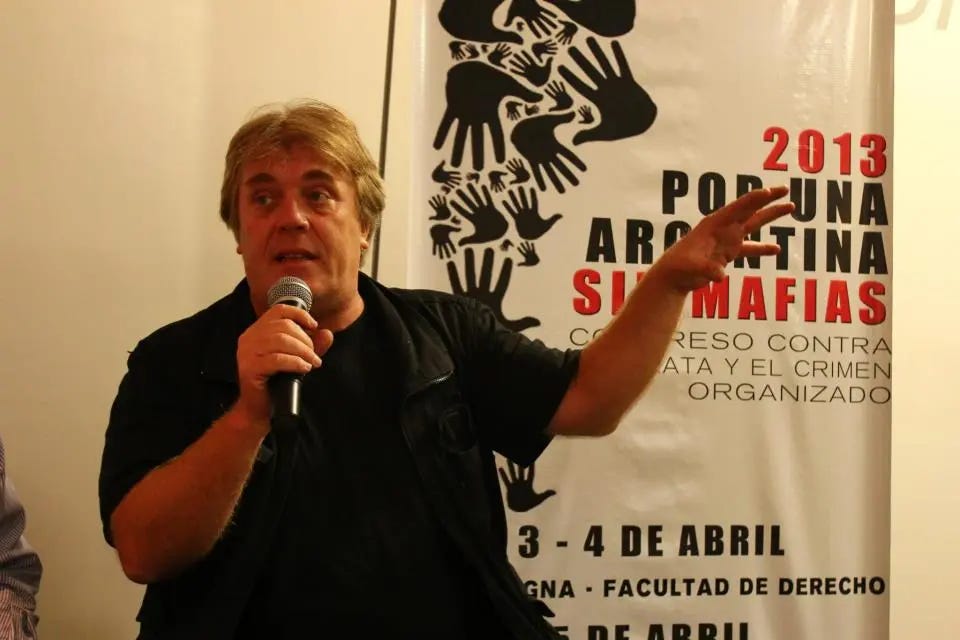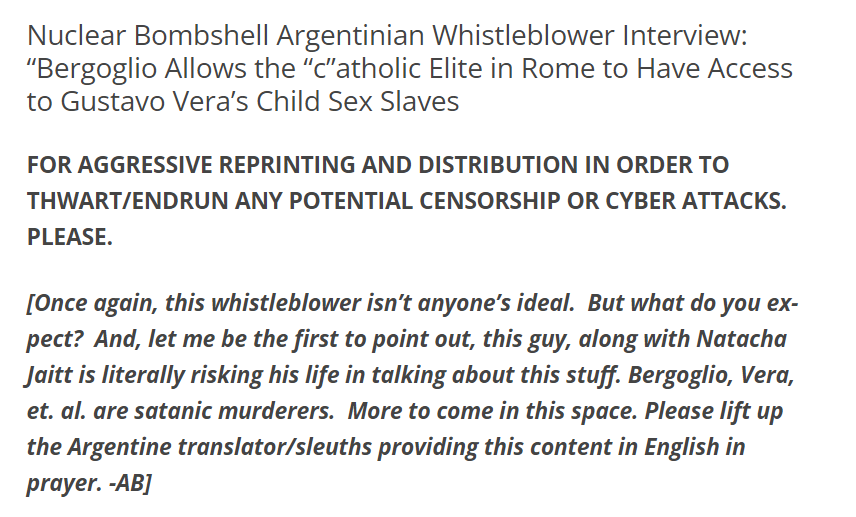Child-trafficking in Argentine football, a pro-NATO scat fiend, SIDE, and scandal: the Natacha Jaitt Case
A Cautionary Conspiracy Tale
DISCLAIMER: This article extensively discusses a strange character who is very active on Twitter. Please do not bother him as a result — look don’t touch.
Organized pedophilia. Ritualized child sex orgies attended by governing elites. The Mossad and CIA. Threats from a powerful intelligence figure. Catholic officialdom, going all the way up to the Vatican — and the Pope himself. Mockery and blanket denials from the mainstream press. The death of a whistleblower who denied any suicidal intent.
For quite a lot of people on Twitter — including some dear friends of this author — such narratives are not only worthy of serious consideration but deeply and urgently political. The violence of global capitalism is most visible in a moment where members of the transnational bourgeoise convene in secret to rape and/or sacrifice children, gatherings which usually are depicted as having an occult or ritualistic overtone. Other factions of the elite, or covert agencies which serve them, gather blackmail material from these unspeakable convocations which are then used to extort the political favors that make the whole system work. Marc Dutroux. Epstein Island. The Franklin Credit Ring. Michael Acquino and the Temple of Set. Some of these have more evidentiary backing than others, and I don’t pretend to be an expert on any of them. Anyway, I’m really not here to scold anyone about conspiracies, just to tell a good yarn. And I have a really good one for you today.
I’ve gotten a lot of my own scolding from “conspiracy” or “parapolitics” people on Twitter — though several of those who blocked me seem, heartwarmingly, to listen to the podcast. It’s funny that that sphere seems to believe that my objections to conspiracy are blanket and coherently political first, rather than just being the product of a really strong love for Bathory. No guy like me wants to hear that — horror of horrors! — the misanthropy and darkness one stews in walking through the snow after a day of being slighted by happy people, pretty girls, parents, bus drivers, graduate admissions counselors, etc. — is actually something those boring suit-and-tie masters of the universe got to first. And to be sure, the media criticism implicit in a lot of parapolitics discussion about Satanism falls a bit too close to Danzig’s Tipper Gore for my own comfort.
Still though, I do have some irate and hard-to-formulate political objections to conspiracy talk. Maybe because in its wide appeal, people can act like learned and critical Marxists while sticking to the lurid and titillating — a hey-you-haven’t-done-the-reading type of nerd resentment. But I do think conspiracy — if by this we mean broadly the activity of covert actors — is a real and structural feature of the capitalist state. Susurluk demonstrated that beyond doubt. And if it wasn’t enough we have the Maidan massacre — a false flag recorded on live-stream! — and countless other examples, especially from the Global South, to further make conspiracy worthy of serious research. Hell, the most ambitious writing project I’ve ever attempted — the AMIA bombing series — literally is about deep politics. I’ll admit some of the more lurid stuff — Satanic Panic revisionism, mind-control, and so on — still strikes me as just plain silly. My genetic cynicism makes the feeling that it’s Marxism-as-slasher-flick hard to shake. But truth is sometimes stranger than fiction, and even the most bizarre or depoliticized conspiracies sometimes have tangible links with state actors — though not always in the ways you expect…
On 23 February 2019, the naked corpse of an Argentine-Jewish model and reality-television personality named Natacha Jaitt (pronounced like the English word “height”) was discovered in a premium suite at the — rather self-importantly named — event space Xanadu, located in the wealthy Buenos Aires suburb of Tigre. Jaitt’s death set off a firestorm on social media, one which has been re-opened to a certain extent by recent developments in the case (to be discussed below). The Jaitt case received substantial media attention and remains the subject of a frenzied discussion, carried on by a mixture of (usually young, female) crime fans and far-right paranoiacs. It also drew interest from the large if hermetically sealed English-language media ecosystem catering to far-right “traditionalist” Catholics, who were excited by scandalous accusations Jaitt had made towards Jorge Mario Bergoglio — the hated liberal Pope Francis.
The story begins the juvenile-league program of Independiente Football Club, located in the working-class Avellaneda neighborhood of Buenos Aires. Juvenile leagues are one of the prouder sporting traditions in Argentina, where clubs offer free or very low-cost opportunities for children and youth to train at a professional level. This is one of the key things which makes Argentine football a uniquely egalitarian slice of world sport. It allows clubs and the national team to draw talent from the entire society — and gives poor children the opportunity to become stars where in other countries and sports social inequality warps the composition of elite athletes in favor of those with the resources to train and travel. The poster boy for this system is, of course, Maradona, who rose from the slums to fame and fortune. It is one of the incredible things that comes from having sport as a publicly-owned good — something which the Milei government, in its usual cartoon-villain fashion, is pushing hard to abolish.
Of course, such youth programs (like pretty much anything involving children) also sometimes attract pedophiles — as Americans learned with the Sandusky case. Such was tragically the case with the juvenile division of Independiente, whose allegations date back to at least 2001, but which finally broke open only in 2018, after a 14 year-old player told a youth psychologist working for the club that he and other boys had been forced to have sex with older men in exchange for payment. The case caused outrage, not only for the obvious reasons but also because the exchange of sex for trivial amounts of money and basic sports equipment made for a particularly disgusting story of very deprived children being exploited by those supposed to be helping them. Ariel Ruiz, the psychologist, reported the comments to his superiors who then immediately notified police. A total of 15 victims were eventually identified and six club officials charged, though a provincial judge eventually ruled that no organized abuse network existed and thus the defendants must be tried separately. That decision, as well as the allegedly lenient pre-trial restrictions imposed on the six men, have themselves raised controversy — but in any case, even if the defendants did coordinate, there are no indications that such went much higher themselves and their own associates outside Independiente. The club’s proactive response after the 2018 report helped in this regard, although the scandal did worsen a crisis Independiente already faced resulting from financial mismanagement and a years-long losing streak.
And Independiente might be the only story here, had it not been for Natacha Jaitt.
Natacha’s life and career were spent on the more depressing side of celebrity. Seeking to escape the sexually repressed environment of her Orthodox Jewish upbringing, Jaitt left home as a teenager and entered sex work, working primarily as a pornographic actress and model. Jaitt later moved to Spain, where she auditioned and was accepted as a contestant on Gran Hermano, that country’s version of the Big Brother reality television franchise. Though voted off in the course of the show, Natacha had succeeded in getting herself out there in the entertainment world and went on to work in radio and television in Argentina, a career primarily spend hosting a string of programs for Playboy TV. She dated widely among the country’s large pool of middling actors and football players, securing for herself a solid if not particularly spectacular place in the hierarchy of stardom.
Natacha Jaitt was not a happy woman, and I want to be clear that she is a victim in this story rather than an antagonist. She struggled with addiction, primarily to cocaine, a death sentence for one’s hopes to be treated with dignity even in the most mental health-obsessed society on the planet. This, coupled with inevitably aging-out of the titillation industry, ensured that by 2018 Natacha was very much a figure of the tabloid world, someone of interest not for being young and beautiful but for once having been young and beautiful — and now fallen to a status where ordinary people (especially women) can attain catharsis for their own frustrations and insecurities in cruelly gawking at her. It was as just such an object of sordid fascination that Natacha was invited to appear on the talk-show Almorzando con Mirtha (Having Lunch with Mirtha). Named for its host, Mirtha Legrand, Almorzado is one of the most popular television programs in Argentine history and has exercised an incalculable influence on the country’s television, film and newscasting. Mirtha, possessed of the fairly banal but all-too-rare skill of being a decent interviewer, began broadcasting in 1968 and did not stop until 2020 (when the COVID pandemic made it too high-risk for the 96 year-old Mirtha to continue hosting in-person lunches). Having Lunch originally started as interviews primarily with film and television personalities but later came to be a coveted interview slot also for a huge array of political, business, sports, etc. figures — including multiple Argentine presidents. Think Walter Cronkite crossed with Oprah, and you’ll approximately have Mirtha Legrand.
Anyway, Natacha Jaitt appeared on the 31 March 2018 broadcast of Mirtha (for those interested, the full program can be found here). It starts out uneventfully enough, with Mirtha introducing her panel of guests — among others, the elderly mother of a Malvinas war hero — until she reaches Natacha around the 21-minute mark. Jaitt immediately launches into a discussion of the then-recent Independiente abuse scandal, after which things rapidly escalate. In a rapid, slightly-hard-to-follow diatribe, she begins to describe how her insider position in Argentine sports and entertainment world led to the discovery of a pedophilia ring extending across and beyond youth football, implicating a dizzying number of sports, trade-union, and religious figures. Most of the names — even those which would be very shocking, like Argentine national team coach Lionel Scaloni — are rattled off in passing with little elaboration. But Natacha is particularly fixated on one man — Gustavo Vera, ally of left-wing Peronist militant Juan Grabois and founder of the La Alameda Foundation. La Alameda began as a popular assembly of Avellaneda residents during the 2001 economic crisis, and after things stabilized became particularly focused on combatting forms of labor smuggling and forced labor and labor trafficking. Today, it is primarily a charitable organization which seeks to provide a community-level response to forced prostitution and narco-trafficking, whose shelters and other services are primarily used by the much-maligned Bolivian immigrant population in Buenos Aires. La Alameda and Vera have received strong support for their efforts from Francis, both as Pope and earlier as Archbishop of Buenos Aires. Natacha Jaitt however, claims that Bergoglio has been the key protector of Gustavo Vera, in turn the kingpin of a child-trafficking cult/mafia which uses its efforts to combat trafficking as ingenious cover. This then provokes a shouting argument with one of the other panelists, who happens to be Vera’s girlfriend (more on whether this was intentional on the part of Mirtha below).
In any case, Natacha Jaitt’s allegations ignited a Pizzagate-style frenzy on the Argentine internet and eventually reached English-language “tradcath” spaces, probably first through the blog of ultra-conservative Catholic writer Ann Barnhardt, a prominent advocate of the idea that Benedict XVI (Joseph Ratzinger) is still pope. Barnhardt linked to a number of videos of Natacha interviewing her source for the allegations specifically about Vera:
That first sentence in the brackets is what we in the business call an understatement.
Jaitt is speaking to the man behind a blog called La Verdad que no Puede ser Ignorada (The Truth Which Cannot be Ignored), who wrote under the pen name “Aldo Andonegui,” but who will be immediately recognizable to Argentine readers as one Artem Reshetnyak.

Artem, a “lolcow” and object of fascination for Argentine Twitter users, may be recognizable to some American readers who follow me there as the man who runs numerous accounts under the name “Artem Joyero Ucraniano” (Artem the Ukrainian Jeweler). He is primarily notable for combining a Gunther Fehlinger-esque advocacy that Argentina join NATO with bizarre sexual obsessions, which Artem likes to describe in excruciating detail:
Artem describes his belief system as “Atlanticismo Chocolatero” (Chocolate Atlanticism). The first term describes his political ideology, which is basically the whole right-wing liberal package — stridently pro-Israel, “West is best,” Russophobic, anti-“populism,” and so on. The second refers to his passionate love for anal sex undertaken without prior douching — that is, with ah, chocolate.
Artem Reshetnyak was born in Kharkhov, Ukraine sometime in the 1980s and immigrated to Argentina in 2001. Despite his intense pride in being “Ucraniano,” Artem is a native Russian speaker and does not have any other languages besides Spanish — which he speaks in the excruciatingly slow manner of a stroke victim (Artem ascribes this to his “Ukrainian accent”). He was active in the Partido Liberal Libertario (literally the Liberal Libertarian Party, although a more accurate translation would be something along the lines of “liberals of the libertarian variety”), an early forerunner of Javier Milei’s La Libertad Avanza, before being expelled in mid-2013 for threatening to murder various fellow party members with whom he had disagreements. He then focused on the La Verdad blog until migrating primarily to Twitter sometime around the pandemic. La Verdad’s output consisted mainly of accusing every Argentine public figure under the sun of unspeakable sexual acts, described in a hallmark crusty-handkerchief level of detail.
Here is a far-from-exhaustive list of claims that Artem has made about various Argentine political, media, cultural and sports figures:
—Javier Milei was molested and extensively raped as a child by his father, Norberto Milei, leaving the now-president with an lifelong inability to have sex except anally, in the passive position. This supposedly accounts for his famous pet English Mastiffs — according to Artem they have the largest penis of any dog breed (???) — and the fact that Milei keeps cloning the original dog, Conan (since it is the only creature capable of sexually satisfying him). In spite of all this, Artem voted for Milei and strongly approves of his performance thus far.
—Prior to supporting Milei, Artem argued that he was funded by the Sinaloa Cartel.
—The neo-Nazi activist Cesar Biondini is in actuality a Jewish Mossad agent trying to honeytrap Argentine antisemites (an operation which Artem applauds).
—The right-wing influencer Iñaki Gutiérrez (who briefly served as social media manager for the Milei administration) and his girlfriend Eugenia Rolón, are sex slaves owned by the eccentric pundit and outspoken Milei critic, Carlos Maslatón. This is allegedly proven because Artem identified (by brand and size) a pair of Maslatón’s underwear in the background of a photo of the couple. Furthermore, Maslatón has forced Iñaki to get an estrogen-secreting device (think the hormone replacement used by trans women) surgically implanted under his skin (not sure if this even exists?), which accounts for the latter man’s baby face and allegedly prominent breasts.
—As part of a secret deal with Mauricio Macri — the exact purpose of which Artem leaves unexplained — during the 2015 elections, the centrist Peronist politician and more recently presidential candidate Sergio Massa prostituted his minor daughter to María Eugenia Vidal, then-governor of Buenos Aires Province. Vidal, according to Artem, is a sort of neo-Elizabeth Bathory who enjoys sadistic torture and rape of young virgin girls. Large dogs are also involved again, somehow.
—Macri also prostituted his daughter, Antonia (b. 2011), this time to Barack Obama.
—Macri himself was castrated as a child by Chinese triad assassins. Artem once again does not explain what purpose this would serve, though he blames it for Macri’s alleged subservience to China and Xi Jinping.
—Reprising the Countess Bathory motif, Artem accuses Mirtha Legrand herself of having an insatiable need to torture and kill little girls, procured on her behalf first by dictatorship-era military officers and later by the intelligence agency SIDE.
—For all this fearless truth telling, Artem claims to have received death threats from the powerful spy boss Jaime Stiuso, who should be familiar to all readers from my series on the AMIA bombing.
—Oh, he’s also into transvestigation.
That really covers a lot of Artem’s output, aside from maybe the bizarre AI-generated videos he makes sometimes (like this one advocating that the Gaza Strip be turned into a gay vacation resort). But I think the most indicative example, and the only one that has received serious treatment (to be found here, by Juan Salinas) is the supposed Gustavo Vera pedophile ring, which according to Artem organizes child sex orgies beneath the Casa Rosada (Argentine presidential palace). Artem’s again, obsessively detailed descriptions of how euphemistic menu items actually are code for different types of children (dark-skinned ones, fat one, ones who struggle, ones with bleeding genitalia, and the list goes on) shows, I think, how, far from being a simple schizophrenic he is a largely sane sexual deviant whose incredibly dark fantasies merged at some point with his commitment to center-right politics. I think there’s a lesson here, if not for why one should be cynical about the more lurid conspiracies then at least for why I am so cynical about them. Not that everyone who is interested in these things and takes them seriously is a freak like Artem, but they serve a titillating function all the same. Entertainment can be just as powerful a draw as sex, and imagining world capitalism as the plot of a particularly extreme horror film is just that impulse displaced into politics — especially for Americans.
The real irony is that the whole reason Artem loathes Gustavo Vera so much is his own passionate support for the sex trade and opposition to anti-trafficking efforts which could put a damper on it:
Artem’s own wife works as a prostitute, and in some obscure chronicles of Reshetnyak lore you can find the rumor that he himself is a sex trafficker or personally involved in that business somehow. I think this is probably true. There is a Chris-Chan level of interest in keeping track of this guy on Twitter and to a lesser extent on the imageboard Devox, but no doxxes of Artem have ever included his workplace nor any proof that he is gainfully employed at all. Moreover, the fact that Artem posts continuously all day and night as well as his wife’s alleged complaint that he makes her prostitute herself in order to avoid having to work militate strongly in this direction as well. Maybe “jewels” are a euphemism for women, and Artem works as a pimp? Or maybe I’m stereotyping Ukrainians. Either way, let’s return to Natacha Jaitt.
I mentioned at the beginning that Jaitt’s death set up an immediate suspicion that she had been assassinated, particularly as netizens remembered the following tweet:

Though the murder theory was championed strongly by Natacha’s flamboyant brother Ulises Jaitt, an autopsy found that she died from heart failure caused by the combined use of alcohol, cocaine and clonazepam (Klonopin), in a body that was already severely weakened by years of addiction. Not only were the toxicology tests conclusive on this point, but security video from the Xanadu showed Natacha ingesting at least the former two substances earlier in the night. Ulises made noises about how Natacha had been sober, or how those substances might have been forced into her, but it seems like an open-and-shut case of something far more quotidian, and in a way sadder, than assassination by shadowy powers-that-be. The drama didn’t end there, mostly because of the dozens of attempts authorities made to open an iPad found among Jaitt’s possessions — speculated by avid case followers to contain hard evidence of Argentine elite pedophilia. Apple is notoriously tight-lipped about the security features of its products, and has a policy of almost blanket refusal to cooperate with authorities in any country seeking to gain access to them. Argentine police brought in an Israeli cybersecurity contractor to break into the iPad — which intially failed — but was finally able to open it last year. The contents, when fully revealed, will probably be disappointing for the Artem Reshetnyaks of the world.
But there is a a spooky addendum to the Natacha Jaitt story. Jaitt was accompanied to the fateful taping of Mirtha by an older friend, Ana Polero — in turn, a former employee of SIDE, the intelligence agency run for decades by Jaime Stiuso as a political police linked to the CIA and Mossad. As I have written previously, SIDE was officially abolished following the 2015 Nisman scandal and replaced with a new, de-Stiusoized agency called the AFI (Federal Intelligence Agency). But even with the big boss gone, SIDE-cum-AFI continues to produce illegal spying scandals, many of which betray its alliance with the entourage of Mauricio Macri which, even in the Milei era, continues to be the dominant right-wing political force in Argentina. Jaitt herself claimed publicly to work for SIDE, which may invite skepticism given her other outlandish statements. But Raul Kollman, arguably the foremost expert in Argentine journalism on spy games, has written at length about how Natacha Jaitt was at the very least an unwitting dupe of SIDE, some evidence for which seems more-or-less incontrovertible:
In 2018, Jaitt produced a national scandal in the wake of her appearance on Mirtha Legrand’s program. The actress denounced a network of child abuse in the juvenile divisions of Independiente, and accused public figures for paying [for sex with children]. Behind the cameras was Ana Polero, linked in various reports to the AFI, who accompanied Jaitt to the filming, and who was apparently in control of the operation.
At the time, the prosecutor Guillermo Marijuan described the case in the following manner: “we are investigating the existence of a group linked to intelligence agencies which could be operating and may have compelled Jaitt to falsely accuse various people.” The Provincial Memory Commission [organization which documents dictatorship-era crimes] also warned that Polero may have coached Jaitt. The main target was a journalist, also pro-Macri, in conflict with the head of AFI. This is how spies are used: to persecute political rivals, but also for internal disputes.
The icing on the cake appeared in the hands of the false lawyer Marcelo D’Alessio. When the judge Alejo Ramos Padilla visited his [D’Alessio’s] home, he found a folder titled Operation Jaitt, in which D’Alessio outlined counterintelligence measures against those who organized Jaitt’s appearance on Mirtha. Another manifestation of the war between spies.
Anyway, Jaitt’s accusations were not limited to what was said in the 2018 broadcast. Her very presence was always explosive Ulises believes that on the iPad can be found new revelations, which point to a murder.
Was Mirtha herself in on it? It seems plausible. She did issue a public apology to all individuals named by Jaitt, though this may have just been perfunctory. The seating of Jaitt and Gustavo Vera’s girlfriend on the same panel just seems too perfect. And Mirtha, beloved as she may be, was allowed to broadcast uncensored through the dictatorship years. It would be more far-fetched to assume she has never had some type of modus vivendi with the Argentine right and its deep state.
So in the end we have an old story. A desperate, expendable person (because addicts are expendable in every society, no matter where you go in the world) is manipulated by covert agencies to carry out their purposes. The sensationalistic nature of Jaitt’s claims, naming extremely prominent figures, was meant to draw people in — and then, because they were drawn in, her accusations against the left and internal enemies would suddenly appear credible. It should teach us something about the malleable nature of conspiracy, both politically as well as even by covert actors themselves. Not that I have any love for Pope Francis by the way, given Horacio Verbitsky’s documentation of the-then bishop’s — at best, cowardly, at worst, complicit — conduct during the military dictatorship. But again, that’s not something you can talk about much. Leftist pedophiles, though? Go for it.
As for Artem, I think any idea that he might be an employee of intelligence can be dismissed out of hand. He is simply too weird — even in Argentina.














